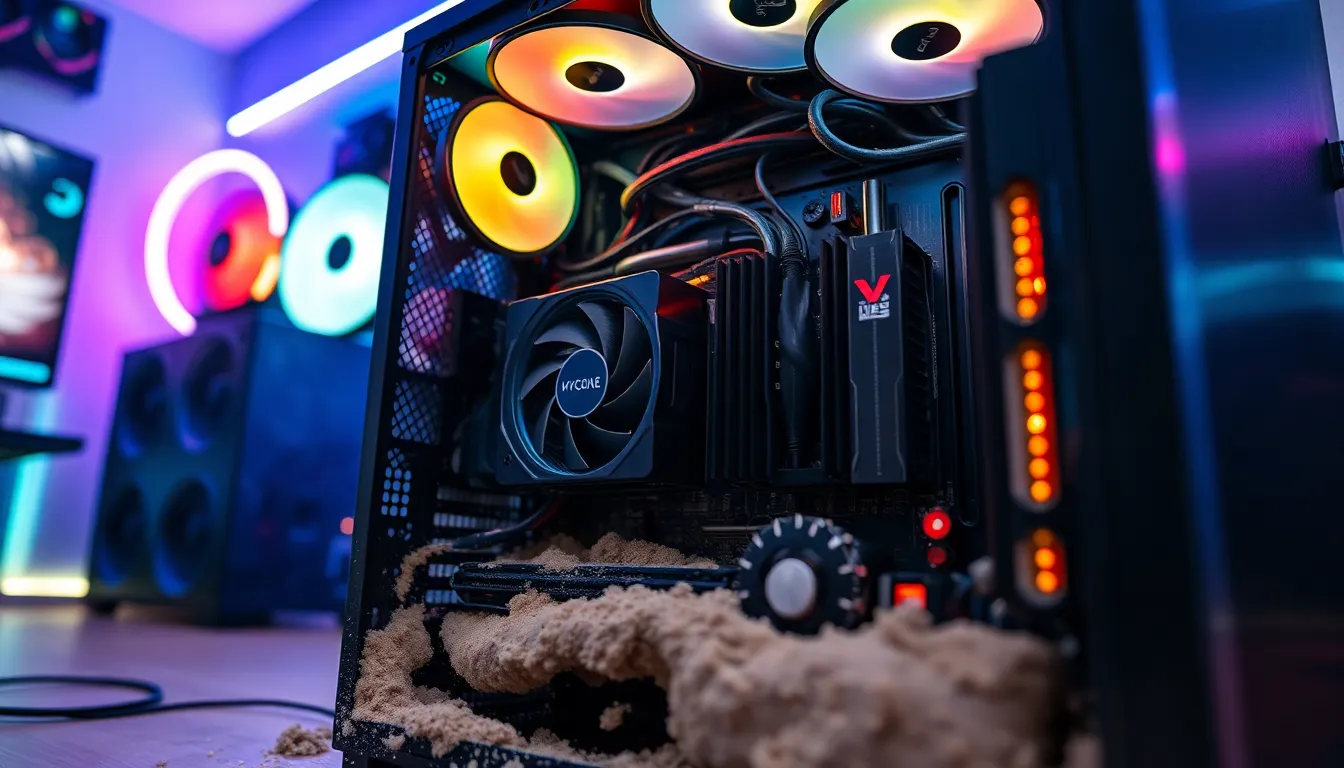Picture this: you’re deep in a virtual battle, adrenaline pumping, when suddenly—bam! Your PC freezes like it just spotted a ghost. It’s a gamer’s nightmare, and it happens more often than anyone wants to admit. Whether you’re slaying dragons or racing cars, nothing kills the vibe like a frozen screen that leaves you staring at a pixelated masterpiece of frustration.
But fear not! Understanding why PCs freeze during gaming can turn your experience from rage-inducing to smooth sailing. From hardware hiccups to software shenanigans, there’s a world of reasons behind that pesky freeze. Let’s dive into the common culprits and equip you with the knowledge to keep your gaming sessions glitch-free, so you can get back to conquering your virtual kingdom without interruption.
Table of Contents
ToggleUnderstanding PC Freezes While Gaming
PC freezes during gaming create disruptions that impact immersion. Identifying symptoms and causes can help gamers pinpoint the issues behind these frustrating interruptions.
Common Symptoms
Game stalling represents a primary sign of a freeze. The screen may lock up, failing to respond to inputs. Audio might also cut out or loop, creating an unsettling sound effect. Visual glitches tend to occur alongside freezing, manifesting as distorted images or flickering screens. A sudden drop in frame rates often signals trouble, leading to noticeable lag between player actions and on-screen responses.
Potential Causes
Hardware limitations present one significant factor. Outdated graphics cards and slow processors struggle to keep up with demanding games. Overheating can also trigger freezes, as components shut down to avoid damage. Software conflicts, including driver issues or background applications, contribute to disruptions. Insufficient memory or storage space may hinder performance, resulting in sudden freezes. Corrupted game files can lead to instability, disrupting gameplay and necessitating repairs or reinstalls.
Hardware Issues

Hardware problems commonly cause PC freezes during gaming sessions. Identifying these issues leads to improved performance and uninterrupted gameplay.
Overheating Components
Overheating components often result in system instability. The CPU, GPU, and other hardware parts tend to create excess heat during intense gaming. Fans that are clogged with dust or malfunctioning can exacerbate this issue. Monitoring temperatures using diagnostic tools helps maintain optimal operating conditions. Components typically exceed safe limits if proper cooling isn’t provided, leading to unexpected freezes. Gamers should clean their systems regularly and ensure adequate airflow to prevent overheating. Upgrading to more efficient cooling solutions also helps in managing temperatures better.
Insufficient Power Supply
Insufficient power supply affects the performance of gaming PCs. A power supply unit (PSU) that lacks adequate wattage struggles to support all connected components. This struggle can lead to system instability, causing random freezes. It is essential to choose a PSU that fits the power requirements of the entire setup. Using a PSU calculator can help gamers determine necessary wattage from all system components. Aging or faulty power supplies may also supply unstable voltages, increasing the chances of freezes. Regular checks and timely replacements of power supplies can significantly enhance system stability during gaming.
Software Problems
Software issues often contribute to a PC freezing while gaming. Identifying and resolving these problems can significantly improve gameplay smoothness.
Outdated Drivers
Outdated drivers frequently cause performance hiccups. Graphics drivers play a crucial role, as they directly affect visuals and responsiveness. Ensuring the latest version is installed minimizes conflicts and optimizes compatibility with new games. Regular updates from manufacturers like NVIDIA and AMD improve performance and stability. Users should prioritize keeping their operating system updated too, as system updates may include important driver updates that enhance overall functionality and security.
Conflicting Background Applications
Conflicting background applications often lead to freezes during gaming sessions. Some programs actively consume system resources, leaving less available for gameplay. Applications like web browsers, streaming software, or even antivirus programs may run unnoticed, creating conflicts with the game. Closing unnecessary applications before launching a game can free up valuable resources. Users can also consider adjusting settings to limit background activity while gaming, ensuring a smoother experience.
Troubleshooting Steps
PC freezes during gaming can often be resolved with strategic troubleshooting. Identifying the right steps leads to smoother gameplay.
Checking Hardware
Start by inspecting the hardware components for issues. Ensure fans operate correctly to prevent overheating, as excess heat disrupts performance. Look at the graphics card for any signs of wear, and verify it’s securely installed in the PCIe slot. Examine the RAM for proper seating and consider running a memory test using available diagnostic tools. Lastly, confirm that the power supply unit provides adequate wattage for the system demands to avoid unexpected shutdowns during gameplay.
Updating Software
Updating software components significantly improves gaming stability. First, check the operating system for updates to resolve compatibility issues that may cause freezes. Keep graphics drivers up to date, as manufacturers like NVIDIA and AMD frequently release optimizations for new games. Adjusting game settings to align with system capabilities reduces the strain on resources, preventing performance hitches. Regularly updating antivirus software also ensures malware doesn’t interrupt gameplay, as hidden threats can consume system resources.
Preventive Measures
Implementing preventive measures can significantly reduce the chances of PC freezes during gaming sessions. Gamers can maintain stability and elevate their experiences through optimized settings and consistent maintenance.
Optimizing Game Settings
Adjusting game settings directly impacts performance. Lowering resolution enhances frame rates. Disabling unnecessary visual effects also helps reduce strain on hardware. Gamers can further optimize settings by selecting balanced or performance presets. Monitoring in-game settings regularly ensures optimal performance without sacrificing graphics quality. Utilizing built-in benchmarking tools aids in finding the right balance between performance and aesthetics.
Regular Maintenance
Routine hardware checks ensure optimal performance. Cleaning dust from components prevents overheating and maintains airflow. Gamers should also inspect cables for damage to ensure stable connections. Regularly checking for firmware updates enhances hardware compatibility with the latest titles. Verifying system performance with diagnostic tools can help in identifying issues before they cause freezes. Avoiding unnecessary clutter on the hard drive by uninstalling unused games and applications improves overall performance. Keeping the operating system updated fixes bugs and vulnerabilities that might lead to freezing.
Experiencing PC freezes while gaming can be incredibly frustrating. By understanding the underlying causes and implementing the recommended solutions, gamers can significantly improve their gaming experience. Regular maintenance and updates are key to ensuring optimal performance.
Focusing on hardware upgrades and software optimizations can prevent those annoying interruptions. By taking proactive steps, gamers can enjoy seamless gameplay and fully immerse themselves in their virtual worlds. With the right knowledge and tools, it’s possible to keep the action flowing without disruption.





